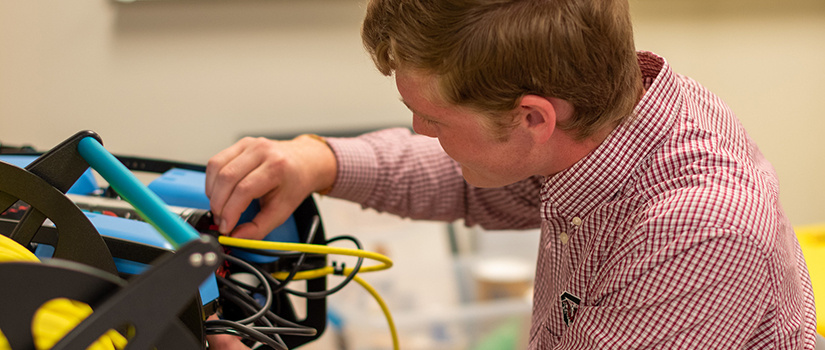Why study Computer Engineering?
Computer engineering integrates electronic engineering with computer sciences. Computer engineers design and develop computer systems and components for computation, control, data storage, input/output and networking. Computer engineers integrate these components into computer and network systems. This requires a good working knowledge of both computer science and electrical engineering.
According to the Bureau of Labor Statistics, employment of computer hardware engineers is projected to grow 6% from 2018 to 2028, in part due to an increase in hardware startup firms and the ongoing increase in devices with computer chips embedded in them, such as household appliances, medical devices and automobiles.
Computer engineers work in technology industries involving computer systems design
and related services. They may work in research and development in the physical, engineering
and life sciences, or they may work in environments with computer and peripheral equipment
manufacturing, semiconductor and other electronic component manufacturing, or in government.
Curriculum
Our computer engineering undergraduate program will provide you with all the training and knowledge needed to start a successful career in computer engineering. The program includes classes that cover software engineering, computer science and electric and digital circuit design. Our curriculum emphasizes project-based learning, including small team projects which are part of most of our computer engineering classes.
Major subjects included in the computer engineering curriculum include:
- Computing in the Modern World
- Algorithmic Design
- Digital Logic Design
- Computing Architecture
- UNIX/LINUX Fundamentals
- Introduction to Software Engineering
- Robotic Applications and Design
- Operating Systems
- Embedded Systems
- Computer Systems Engineering
- Data Structure and Algorithms
- Computer Networks
- Electrical Science
- Circuits
- Signals and Systems
- Electronics
- Professional Issues in Computer Science and Engineering
- Advanced Digital Design
Optional concentrations in the major allow students to specialize in either:
- Artificial Intelligence
- Cybersecurity
The curriculum also includes the Carolina Core, foundational math and science courses, and computer engineering electives. Independent study and special topics courses also provide unique learning opportunities.
Visit Undergraduate Curricula and Courses for additional curriculum details.
Computer Engineering Electives
The computer engineering curriculum includes major electives that allow a student to obtain content depth in a specialization or a breadth of knowledge across several areas.
For example, students interested in the physical, cognitive and algorithmic aspects of robots benefit from elective courses in robotics, artificial intelligence, digital signal processing and control systems. Elective courses in computer crime and forensics and information security principles help prepare students to combat computer-based criminal activities such as hacking, identity theft and computer-based scams.
Major electives also allow students to enhance their degree with focused study in software engineering, hardware engineering and other areas of computer science and engineering.
Capstone Projects
Computer engineering students complete capstone group projects in both software engineering and computer engineering. Capstone projects enable students to apply the techniques, skills and tools of modern computer engineering practice to design a system consisting of both hardware and software components.
Projects involve embedding general purpose communication protocols (SPI, I2C, UART, etc.) and developing and debugging “bare metal” software (software that executes without an operating system). Hardware and software interfacing and co-design, including the use of sensors and actuators and human interface device such as buttons, switches, LEDs and displays, leads to the construction of multi-component platforms using soldering and wire wrapping techniques. You'll use laboratory bench equipment, oscilloscopes, logic analyzers, digital multimeters, power supplies and signal generators to test your products and prototypes.
Extracurriculars
Computer engineering students participate in a variety of clubs including our student chapters of:
- Association for Computing Machinery
- GamecockFIRSTers/FRC Team 4901 Garnet Squadron
- Minorities in Computing
- Women in Computing
Undergraduate research opportunities in the areas of artificial intelligence, computer vision, computational and autonomous field robotics, heterogeneous and reconfigurable computing, and intelligent circuits, architectures and systems are available. Undergraduate researchers get involved on a volunteer, course credit or paid position basis.
With other undergraduates in our college, computer engineering students take full advantage of living-learning communities, mentorship opportunities, study abroad, intramurals, internships, just hanging out with friends, and more.
Visit Student Experience to learn more.
